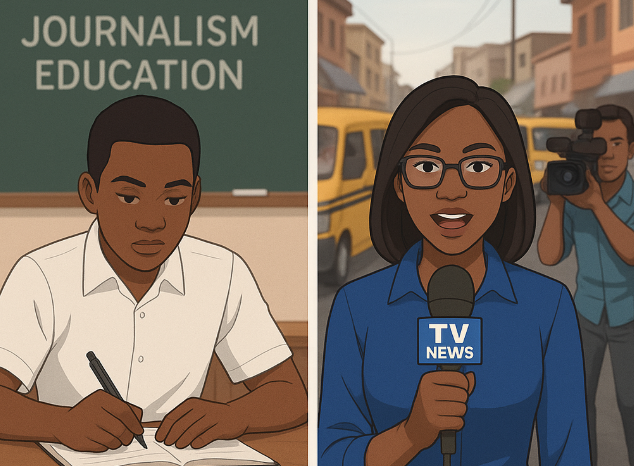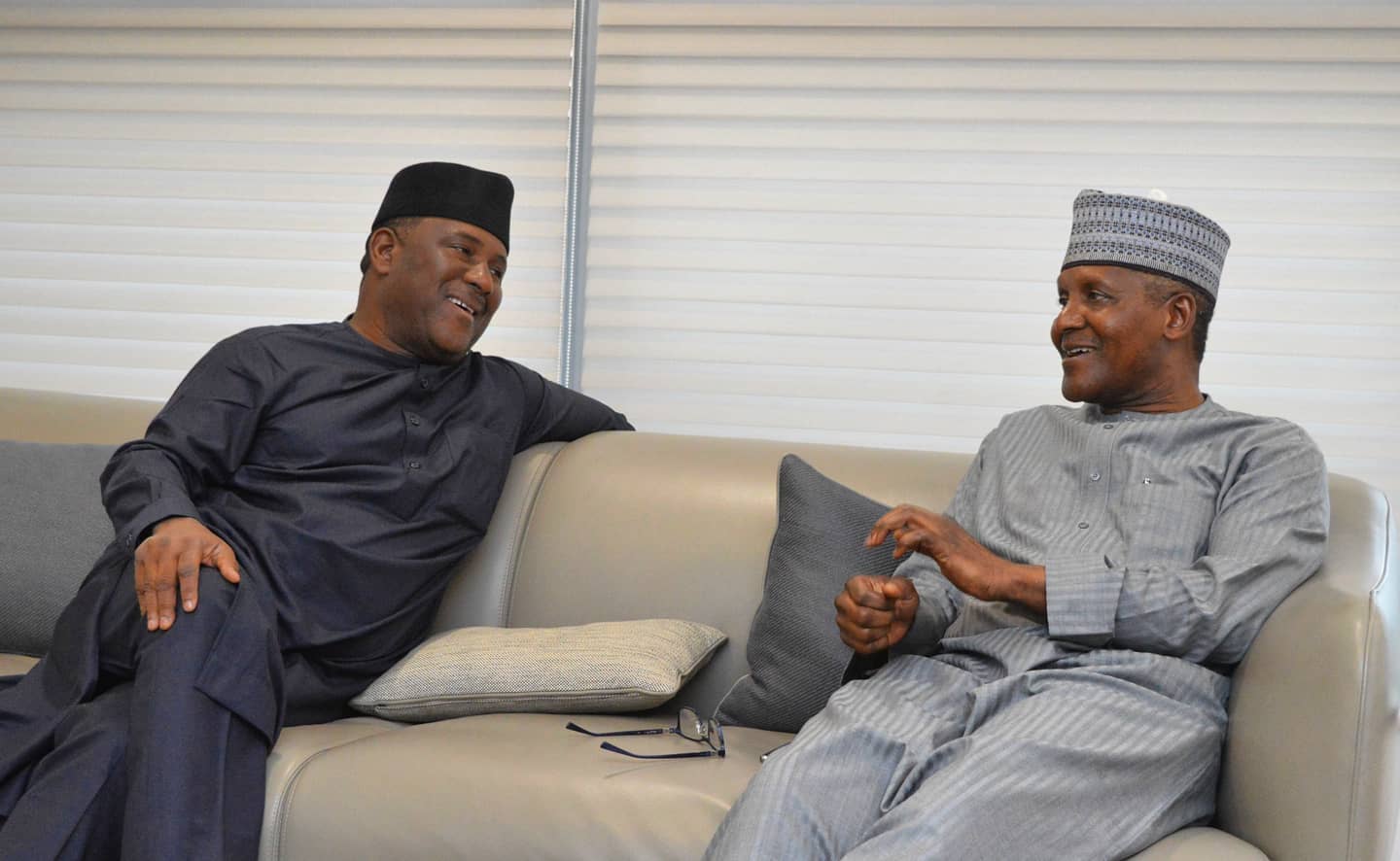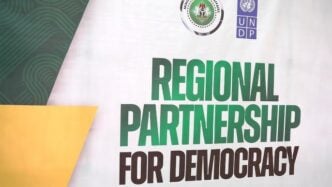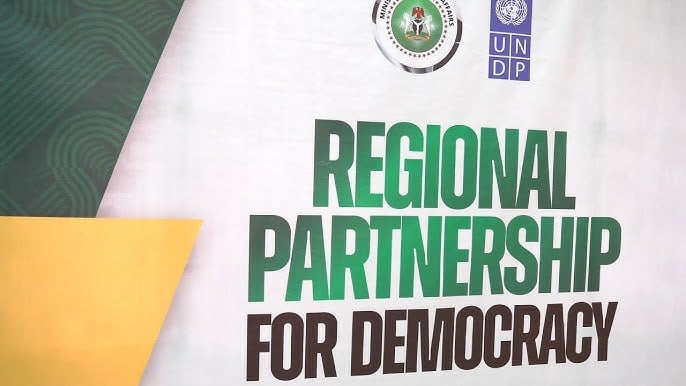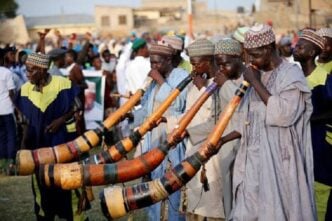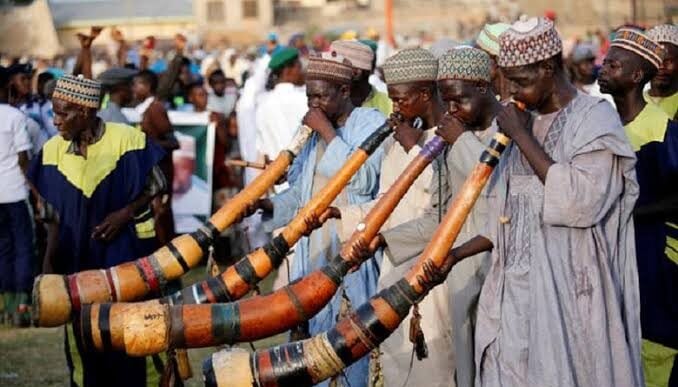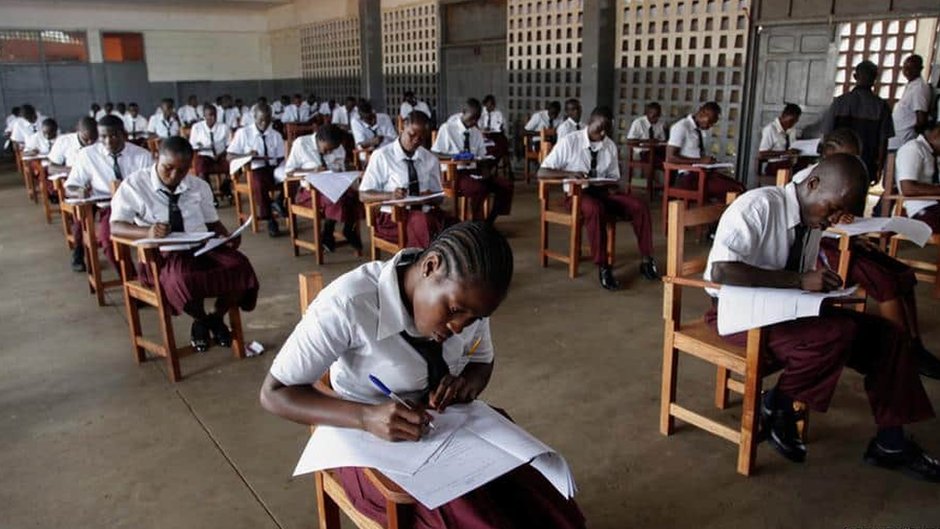Journalism education versus experiential learning...Image created by Chat GPT
BY KEMI BUSARI
The date is February 19, 2021. In the gallery and press room of Nigeria’s house of representatives, dozens of journalists reluctantly picked up their gadgets to report a troubling development.
A lawmaker, Ottah Agbo, has just proposed an amendment to the Nigeria Press Council Act, seeking to mandate the possession of a journalism degree for anyone who wishes to practice. Defaulters, according to the bill, should face a fine of ₦200,000 or a two-year jail term.
Nigerian journalists are confronted with the real-life implications of the bill, a reincarnation of previous attempts to regulate their work by external forces. A striking example came when the chairman of the Rivers state council of the Nigeria Union of Journalists (NUJ) announced that the council is working to apprehend journalists without journalism degrees, labelling them “quacks” and “unqualified professionals.”
Advertisement
Since then, some individual journalists have come under fire. Notably, in 2023, Rufai Oseni, a popular anchor on Arise TV, was accused by a politician, Jesutega Onokpasa, of “pretending to be a journalist” for asking allegedly biased questions on a show. Commenters responding to the altercation questioned Rufai’s credibility as a journalist, citing his lack of a formal journalism degree.
More recently, Rufai was publicly challenged for not having a journalism degree: “Oseni Rufai, you studied Animal Anatomy, and you are on Arise as an on-air personality. You cannot face me and call yourself a journalist…you didn’t study journalism,” Lere Olayinka, media aide to controversial minister, Nyesom Wike, said on a live show.
Debates around the professionalisation of journalism have long existed and remain contested. In recent years, attention has increasingly shifted towards making a journalism degree a foundational requirement for practice. However, many Nigerian journalists have resisted this — the efforts to make a journalism degree the primary marker of credibility — pointing to the success of renowned journalists without such qualifications and emphasising the importance of diversity to adequately cover societal issues. They do this through interviews, op-eds and other means.
Advertisement
At organisational level, some newsrooms such as The Nation, Punch, ThisDay, and The Guardian once marked an “information blackout day” by featuring front pages with an image of a sealed mouth behind bars, symbolising the silencing of the press. This was in protest of several laws that seek to gag the press of which the amendment to the NPC Act is one.
In this piece, I contend that much of the pushback from journalists on the debate between formal journalism education and experiential learning is based on assumptions and myths or philosophy. I break this down into eight questions that could kick-start our scientific exploration into answering the “who is (considered) a journalist” question.
1. What is the composition of journalists with and without formal journalism education in Nigeria?
For Nigerian journalists to effectively make the case for their qualifications despite not holding journalism degrees, there must be statistical evidence showing the educational backgrounds of practising journalists, including their fields of study. The NUJ compendium, containing the names of 5945 journalists, is the closest we have to this. But that list is outdated and currently contains names of non-members and probably some dead journalists. Beyond getting these statistics, there is a need for a reliable mechanism to collect and update this information on a periodic basis, maybe yearly. When confronted with the journalism degree question, rather than for a journalist to say “my editor studied animal husbandry and he is thriving” such journalists would quote data that shows a percentage and supports their argument.
Advertisement
2. Who or what has defined a journalist in Nigeria?
Dr. Reuben Abati, co-anchor on Arise TV, rightly described journalism as a “multidisciplinary field,” one that welcomes diverse backgrounds. However, to fully understand and engage in the current debate about who qualifies as a journalist, it is essential to take several steps back and trace the historical evolution of journalistic identity in Nigeria, from the pre-colonial period through the eras of nationalism, military rule, democracy, and now the digital age. This historical journey, embedded in Nigeria’s laws, policies, reforms and legal proceedings, provides the necessary foundational and contextual basis for any argument about the profession’s boundaries today.
3. Do newsrooms care about your course of study?
More questions: Do the editors care about your degree or course of study during recruitment? What are the major criteria for entry into Nigerian journalism? What qualities do newsrooms and editors look out for? These burning questions will provide a solid response for ongoing debates about professional qualification and the need, or lack thereof, for a journalism degree. Understanding newsroom recruitment practices will help clarify whether formal education or practical skills and experience hold more weight in hiring decisions. Several scholars have examined the journalism education versus experiential learning debate – Hugo De Burgh, Maniou et al., Barbie Zelizer, and Cherian George, to mention but a few. It is high time we had a Nigerian version of the scholarly debate. If journalism education is meant to supply the industry with skilled individuals, recruiters’ preference needs to be considered in the conversation.
Advertisement
4. To what extent should we base journalism professionalisation on ethics?
Agbo justified his sponsorship of the bill by citing the prevalence of quackery (lack of ethics) in Nigerian journalism. Philosophical thinkers such as Stephen Reese and revered journalism icon, Dapo Olorunyomi, have upheld ethics as a foundational principle of professional journalism. Previous studies, such as those by Olajide et al. and Andrew Alibbi, have explored how practices like gratification are seen as key markers separating professionals from non-professionals. I would argue that adherence to ethical standards remains one of the strongest indicators of professional journalism. However, in an era of a democratized media landscape, this argument faces some challenges: who gets to define what is ethical? Is ethics alone a sufficient criterion for determining who qualifies as a journalist? Can ethical frameworks (mostly viewed as enduring) keep up with the rapidly evolving landscape of media practices? These questions are especially pressing when considered against the backdrop of the Nigerian Press Council’s Code of Ethics, which was reported to have been updated in 2022. I read in the news that the 15-point ethical code promulgated in 1998 had been updated to a 41-point code in 2022, but the NPC website still has the previous version. Even if stakeholders all agree that ethics is the primary marker of professionalism, who defines ethics? Who gate-keeps its adherence or lack of?
Advertisement
5. What are the common career entry paths for journalists who don’t possess journalism degrees?
About 15 years ago, during an unofficial internship in a newsroom, I observed that many journalism students were assigned mostly administrative tasks or sent on errands, far removed from actual newsroom training. Over the years, I’ve also had conversations with journalists who admitted they entered the profession out of boredom or because someone offered them a job slot. In their study, Olajide et al. linked the dwindling quality of Nigerian journalism to the non-professionalism which has allowed “every dick and harry” to dabble into the profession “either to make ends meet, practice for political ambition or easily pick it up at the time of employment recession in Nigeria.” While that study certainly needs a critical update, it sparks an important conversation. We need reliable empirical data to interrogate how journalists in Nigeria enter the profession, in order to shape meaningful and relevant policy. Around the world, journalism institutions and practitioners develop “ways of knowing”, that is, the methods through which newcomers learn the practice. Based on experience, I know the several ways colleagues have joined journalism practice. However, to establish effective policies that define minimum entry standards and gatekeeping, we need empirical evidence to support our observations.
Advertisement
6. Do the audience care about journalists’ degrees?
I often say journalists should cover issues of public interest and not necessarily issues interesting to the public. This stems from a deep understanding of journalism’s responsibility to shape public opinion. However, that role is increasingly under threat. Deloitte’s 2025 Digital Media Trends Survey shows that 56% of Gen Z and 43% of millennials now consider social media content more relevant than traditional media. Similarly, a 2024 Pew Research study found that 37% of adults under 30 get their news from influencers, whom they view as more relatable and trustworthy than traditional journalists. While these studies reflect audiences outside Nigeria, the implications are universal and given such reality we are forced to ask: if the audience is disengaged from journalists’ work, do they even care about their qualifications? And for those who are engaged, does a journalist’s educational background matter for how they perceive the news?
Advertisement
7. How do we address the newsroom-classroom gap?
There are two major perspectives on the professionalisation of journalism. On one hand, some argue that journalism cannot be classified as a formal profession like medicine or law because freedom of expression is a fundamental right, enshrined in instruments such as Article 19 of the United Nations Universal Declaration of Human Rights (UDHR). On the other hand, others contend that the responsibility to inform the public imposes ethical and professional obligations that require formal academic training. In Nigeria, scholars have engaged with this debate, highlighting a gap between journalism education and newsroom realities. For example, Olusegun Ojomo’s study reveals three core issues: the current academic system often admits students lacking a genuine interest or aptitude for journalism leading to a mismatch between student capabilities and industry demands; journalism faculty mostly consist of a academics who lack industry experience and mostly teach theories; and existing curricula may not adequately address the dynamic nature of modern journalism. These findings suggest that even those with journalism degrees may lack essential practical skills. While several studies have proposed reforms, the question remains: when and how will they be implemented?
8. What obtains elsewhere?
While I’ve not fully grappled with the history and literature of other countries on this, I can say a few of what I know. Journalism practice is increasingly defined by journalism education in several parts of the world. According to the 2022 American Journalist Study, the percentage of U.S. journalists with at least a bachelor’s degree, majoring in journalism, radio-TV, telecommunication, mass communication, or communication, is 60.6 %, the highest since the data was first collected in 1982. As of 1971, about 42% of American journalists don’t even have any degree at all? What changed, how and when? In Denmark, the system is heavy on both education and experiential learning. Journalists’ period of internship take about two and half years pre-and post formal education. In the UK, formal journalism education is not a legal requirement to practice journalism; however, it can significantly enhance employability and career progression. Many employers value qualifications (more of accreditation to me) from recognised bodies such as the National Council for the Training of Journalists (NCTJ). According to the 2024 Destinations of NCTJ Diploma in Journalism students report, NCTJ graduates are three times more likely to secure a journalism job within 15 months. 88% of NCTJ graduates secured a journalism-related job within 15 months, compared to 28% of journalism graduates without the qualification. We shouldn’t simply copy the experiences or policies of other countries, but we do need to understand their journeys and consider what lessons they offer. Any adoption of their approaches must be carefully adapted, with priority given to our own history and local realities. Nigerian journalism has developed through distinct influences and should continue to grow in a way that reflects these. At the same time, we can selectively borrow the best practices that align with our context to improve our practice.
GOING FORWARD
The list of questions is exhaustive, but this is a good place to begin. Understanding these issues from a social-scientific perspective would offer an objective foundation for any laws, policies, self-regulation, or other forms of oversight we hope to apply to journalism. Too often, we as journalists encourage a mythic image of our role and values such that when those are questioned by outsiders, our response tends to be emotional rather than evidence-based.
Make no mistake, the debate about journalism education versus experiential learning is not going away, it would only be renegotiated in response to changes in the practice. Not long ago, the tension was primarily between practitioners in traditional media and those in digital platforms/bloggers. I recall this experience when I was covering the Nigerian Senate, a certain press corps chairman discriminated against online media practitioners to the point of reserving chairs for their traditional media colleagues while many digital media journalists stood during the plenary. I fought that to a halt.
This piece is not an attack. It is a call to action – a reminder that our arguments should be grounded in facts, not assumptions, not myths. On the surface, we may think we know the answers to these pressing questions, but as I have often asked some journalists I’ve worked with when dealing with their stories, “Where is your empirical evidence?” Fortunately, I know of a journalist-researcher who is exploring some of these issues. Hopefully, their findings can offer the data and insights we need to move this conversation forward.
Views expressed by contributors are strictly personal and not of TheCable.
